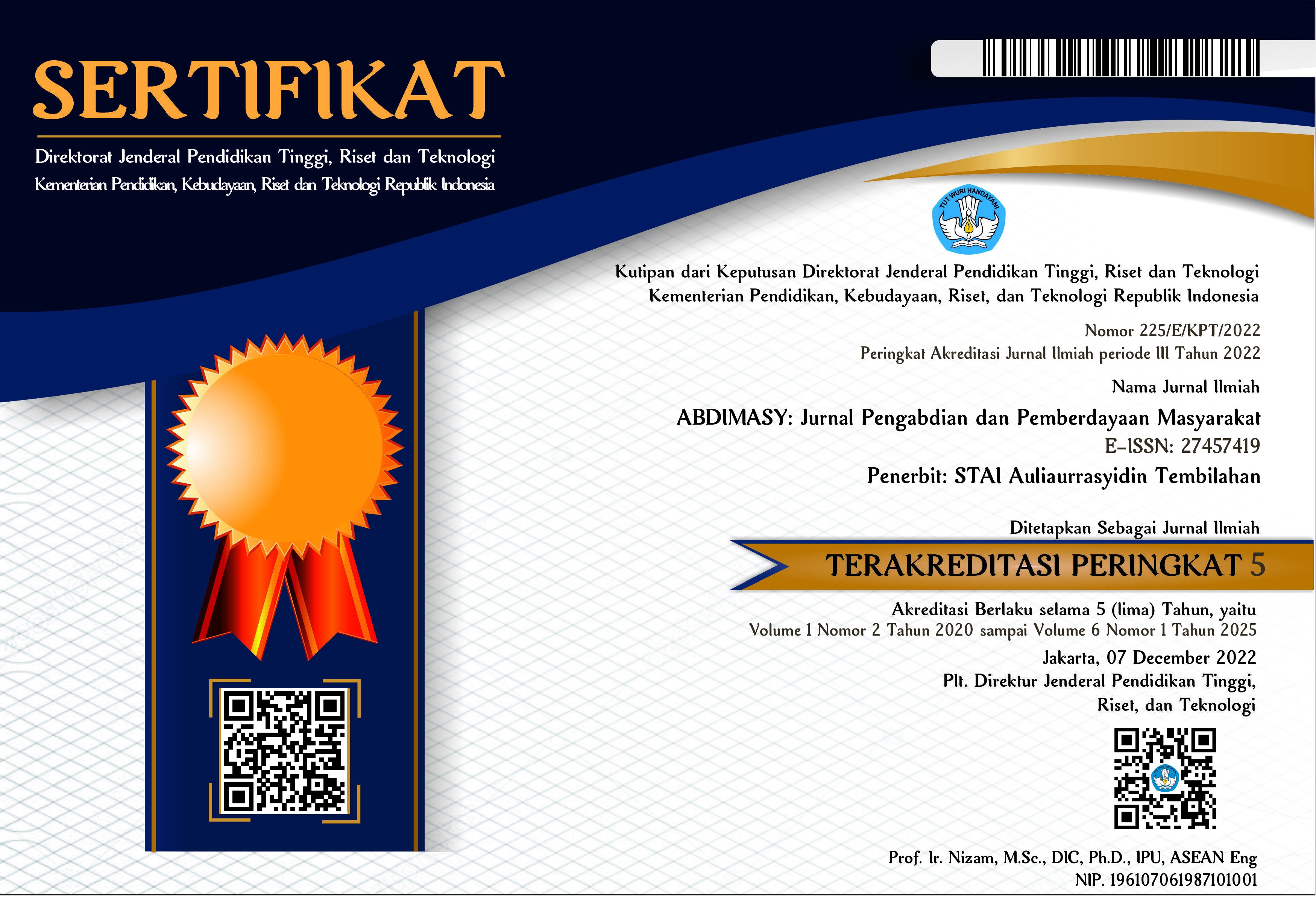Pelatihan Perkoperasian pada Koperasi LaRiba Indragiri di Tembilahan
DOI:
https://doi.org/10.46963/ams.v4i1.688Keywords:
Cooperative, TrainingAbstract
Cooperative training is a work program from the STAI Auliaurrasyidin Tembilahan Islamic economics study program which is expected to increase students' interest in cooperating and increase knowledge in the field of cooperative economics. Methods This service activity is carried out using direct methods in the field. The audience for this service are Islamic economics students in semester VII (eighth). This training program is carried out for approximately 2 (two) months. From the results of the evaluation of community service activities regarding cooperative training through the LaRiba cooperative, the benefits include: Increased knowledge and understanding of students regarding the benefits of cooperatives, Increased knowledge and understanding of students regarding the procedures for forming cooperatives and Increased awareness and desire of students to participate and invite the community to become members of cooperatives. Through cooperative training, members of the LaRiba cooperative will receive greater benefits. They will have better access to cooperative products and services, improve their skills, and get better opportunities to participate in cooperative decision-making. Thus, it is hoped that the welfare of members can be improved.
Downloads
References
Abu Sura‟i Abdul Hadi. (1993). Bunga Bank dalam Islam. cet. ke-2. Surabaya: al-Ikhlas
Ropi Marlina, Yola Yunisa Pratami, Amwaluna: Jurnal Ekonomi dan Keuangan Syariah Vol. 1 No.2 (Juli, 2017), Hal 263-275 Online ISSN : 2540-8402 | Print ISSN : 2540-8399
S.T Kansil. (1989). Pengantar Ilmu Hukum dan Tata Hukum Indonesia. cet. ke-8. Jakarta: Balai Pustaka
SUSANTO, S., Sarwani, S., & Afandi, S. (2018). Analisis Kinerja Keuangan Untuk Mengetahui Tingkat Kesehatan, Pertumbuhan Dan Prospek Usaha Pada Unit Usaha Koperasi (Studi Kasus Koperasi Awak Pesawat Garuda Indonesia di Tangerang). Inovasi, 1(1).
Taqiyuddin An-Nabhani. (2004). Nidham Al-iqtishodi fi Al-islam (Sistem Ekonomi Islam). Dar Al-Ummah
Undang-Undang Nomor 17 Tahun 2012 tentang Perkoperasian. Pasal 1 ayat (3)
Yusuf as-Sabatin. (2011). Bisnis Islam dan Kritik Atas Praktik Bisnis Ala Kapitalis. Bogor: al-Azar Press
Zainudin, Muhammad Jamhari. (1999). al-Islam (Muamalah dan Akhlak). Cet.1. Bandung: CV. Pustaka Ceria
Downloads
Published
Issue
Section
License
Copyright (c) 2023 Sai'in Sai'in, Risviyaldi Risviyaldi, Seri Yanti Siagian, Siti Zariah, Ali Muhakam, Sapria Rahman, Taufiq Hidayat, Toni Ardiansyah

This work is licensed under a Creative Commons Attribution-ShareAlike 4.0 International License.
Authors who publish with this journal agree to the following terms:
1. Copyright on any article is retained by the author(s).
2. The author grants the journal, right of first publication with the work simultaneously licensed under a Creative Commons Attribution shareAlike 4.0 International License that allows others to share the work with an acknowledgment of the work’s authorship and initial publication in this journal.
3. Authors are able to enter into separate, additional contractual arrangements for the non-exclusive distribution of the journal’s published version of the work (e.g., post it to an institutional repository or publish it in a book), with an acknowledgment of its initial publication in this journal.
4. Authors are permitted and encouraged to post their work online (e.g., in institutional repositories or on their website) prior to and during the submission process, as it can lead to productive exchanges, as well as earlier and greater citation of published work.
5. The article and any associated published material is distributed under the Creative Commons Attribution-ShareAlike 4.0 International License





2.png)



